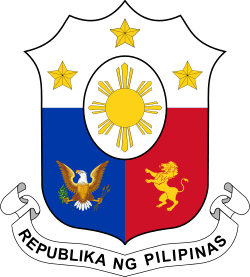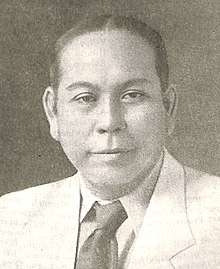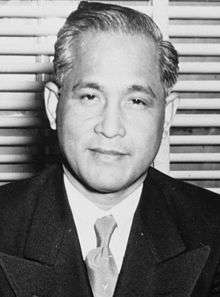1949 Philippine Senate election
Elections for the members of the Senate were held on November 8, 1949 in the Philippines.
| |||||||||||||||||||||||||||||||
8 (of the 24) seats in the Senate 13 seats needed for a majority | |||||||||||||||||||||||||||||||
|---|---|---|---|---|---|---|---|---|---|---|---|---|---|---|---|---|---|---|---|---|---|---|---|---|---|---|---|---|---|---|---|
| |||||||||||||||||||||||||||||||
| |||||||||||||||||||||||||||||||
 |
|---|
| This article is part of a series on the politics and government of the Philippines |
|
|
|
Constitutional commissions |
|
Related topics |
|
|
While President Elpidio Quirino won a full term as President of the Philippines after the death of President Manuel Roxas in 1948, and his running mate, Senator Fernando Lopez won as Vice President, their Liberal Party won all of the contested seats in the Senate. Despite factions created in the administration party, Quirino won a satisfactory vote from the public.
It was the only time in Philippine history where the duly elected president, vice president and senators all came from the same party, the Liberal Party.
Carlos P. Romulo and Marvin M. Gray, publisher of the Manila Evening News, accuse Quirino in their book The Magsaysay Story (The John Day Company, 1956, updated - with an additional chapter on Magsaysay's death - re-edition by Pocket Books, Special Student Edition, SP-18, December 1957) of widespread fraud and intimidation of the opposition by military action, calling it the "dirty election".
Results
Per candidate
| Rank | Candidate | Party | Votes | % | ||
|---|---|---|---|---|---|---|
| 1. | Quintin Paredes | Liberal | 1,756,898 | 49.1% | ||
| 2. | Esteban R. Abada | Liberal | 1,685,520 | 47.1% | ||
| 3. | Lorenzo Sumulong | Liberal | 1,615,124 | 45.1% | ||
| 4. | Enrique B. Magalona | Liberal | 1,577,083 | 44.1% | ||
| 5. | Tomas Cabili | Liberal | 1,575,075 | 44.0% | ||
| 6. | Macario Peralta, Jr. | Liberal | 1,566,376 | 43.8% | ||
| 7. | Justiniano Montano | Liberal | 1,515,569 | 42.3% | ||
| 8. | Teodoro de Vera1 | Liberal | 1,486,158 | 41.5% | ||
| 9. | Claro M. Recto | Nacionalista | 1,390,528 | 38.8% | ||
| 10. | Alejo R. Mabanag | Nacionalista | 1,150,818 | 32.1% | ||
| 11. | Trinidad Legarda | Nacionalista | 1,108,732 | 31.0% | ||
| 12. | Jose O. Vera | Nacionalista | 1,101,996 | 30.8% | ||
| 13. | Jose Ma. Veloso | Nacionalista | 1,069,817 | 29.9% | ||
| 14. | Marcelo Adduru | Nacionalista | 1,053,754 | 29.4% | ||
| 15. | Pedro Hernaez | Nacionalista | 1,025,342 | 28.6% | ||
| 16. | Domocao Alonto | Nacionalista | 999,581 | 27.9% | ||
| 17. | Jose T. Nueno | Liberal (Avelino Wing) | 391,394 | 10.9% | ||
| 18. | Salipada Pendatun | Liberal (Avelino Wing) | 374,340 | 10.5% | ||
| 19. | Olegario Clarin | Liberal (Avelino Wing) | 346,921 | 9.7% | ||
| 20. | Filemon Sotto | Liberal (Avelino Wing) | 343,823 | 9.6% | ||
| 21. | Felicidad Manuel | Liberal (Avelino Wing) | 340,781 | 9.5% | ||
| 22. | Aurelio Intertas | Liberal (Avelino Wing) | 293,630 | 8.2% | ||
| 23. | Jose Tando | Liberal (Avelino Wing) | 291,550 | 8.1% | ||
| 24. | Apolonio Curato | Liberal (Avelino Wing) | 267,073 | 7.5% | ||
| 25. | Leonardo Tenebro | Independent | ||||
| 26. | Cesar Bulacan | Independent | ||||
| Total turnout | 3,579,917 | 69.7% | ||||
| Total votes | 24,336,652 | N/A | ||||
| Registered voters | 5,135,814 | 100.0% | ||||
| Note: A total of 27 candidates ran for senator. | Source:[1] | |||||
- ^1 Replaced by Claro M. Recto as per decision of Senate Electoral Tribunal dated April 3, 1952.
Per party
The Liberals originally had 19 seats entering the 2nd Congress, but the election of Senator Fernando Lopez to the vice presidency meant that his seat is vacant until 1951, when it was contested in a special election.
| Party | Popular vote | Seats | ||||||||
|---|---|---|---|---|---|---|---|---|---|---|
| Total | % | Swing | Won | Before | After | % | +/− | |||
| Liberal | 12,782,449 | 52.5% | 8 | 15 | 18 | 66.7% | ||||
| Nacionalista | 8,900,568 | 36.6% | 0 | 8 | 4 | 29.2% | ||||
| Liberal–Avelino wing | 2,649,512 | 10.9% | 0 | 0 | 0 | 0.0% | ||||
| Independent | 4,123 | 0.0% | 0 | 0 | 0 | 0.0% | ||||
| Popular Front | – | – | — | 0 | 1 | 1 | 0.0% | |||
| Totals | 24,336,652 | 100% | — | 8 | 24 | 23 | 95.8% | |||
References
- Christof Hartmann; Graham Hassall; Soliman M. Santos, Jr. (2001). Dieter Nohlen, Florian Grotz and Christof Hartmann (ed.). Elections in Asia and the Pacific Vol. II. Oxford University Press. pp. 185–230. ISBN 0199249598.

